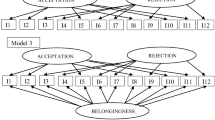Abstract
The purpose of this study was to investigate the reliability and validity of Turkish version of the General Belongingness Scale (GBS; Malone et al. in Personality and Individual Differences, 52(3):311–316, 2012). The adaptation process was carried out with four independent studies, examining the data from two Turkish universities. In study 1, linguistic equivalence of the scale was examined. In study 2, after ensuring the linguistic equivalence, construct, convergent and concurrent validity of the GBS were analyzed. In study 3, predictive validity of the GBS was examined in order to provide additional evidence for the construct validity of the scale. In study 4, the internal consistency and test-retest reliability of the GBS were investigated. The results of this study revealed that both two-factor structure (Acceptance/Inclusion and Rejection/Exclusion) and one-factor structure of the GBS were acceptable. The GBS demonstrated positive relations with social connectedness, social safeness, life satisfaction and subjective happiness while negative relations with loneliness. Results also revealed that extroversion, agreeableness, conscientiousness, openness, life satisfaction and subjective happiness were all positive predictors of the GBS. Finally, the results of the study indicated high levels of internal consistency and test retest reliability. These findings suggest that The GBS is suitable for use among Turkish youth. Suggestions for future research and for the use of the GBS were offered.
Similar content being viewed by others
References
Akin, A., & Satici, S. A. (2011). Subjective Happiness Scale: A study of validity and reliability. Sakarya University Journal of Education Faculty, 21, 65–77.
Akin, A., Uysal, R., Ozkara, N., & Bingol, T. Y. (2012).The validity and reliability of the Turkish version of the Social Safeness and Pleasure Scale (SSPS).Applied Education Congress (pp 13–15). Ankara, Turkey.
Anant, S. S. (1966). The need to belong. Canada’s Mental Health, 14, 21–27.
Asendorpf, J. B., & Wilpers, S. (1998). Personality effects on social relationships. Journal of Personality and Social Psychology, 74, 1531–1544. doi:10.1037//0022-3514.74.6.1531.
Bacanli, H., Ilhan, T., & Aslan, S. (2009). Beş faktör kuramına dayalı bir kişilik ölçeğinin geliştirilmesi: Sıfatlara Dayalı Kişilik Testi (SDKT). Türk Eğitim Bilimleri Dergisi, 7(2), 261–279.
Baumeister, R. F., & Leary, M. R. (1995). The need to belong: Desire for interpersonal attachments as a fundamental human motivation. Psychological Bulletin, 117, 497–529. doi:10.1037//0033-2909.117.3.497.
Bowlby, J. (1969). Attachment and lossm, Vol. 1: Attachment. New York: Basic Books.
Brislin, R. W. (1980). Translation and content analysis of oral and written material. Handbook of Cross-Cultural Psychology, 2(2), 349–444.
DeWall, C. N., Deckman, T., Pond, R. S., & Bonser, I. (2011). Belongingness as a core personality trait: How social exclusion influences social functioning and personality expression. Journal of Personality, 79(6), 1281–1314. doi:10.1111/j.1467-6494.2010.00695.x.
Diener, E., Emmons, R. A., Larsen, R. J., & Griffin, S. (1985). The Satisfaction with Life Scale. Journal of Personality Assessment, 49, 71–75. doi:10.1207/s15327752jpa4901_13.
Dogan, T., Çotok, N. A., & Gocet Tekin, E. (2011). Reliability and validity of the Turkish Version of the UCLA Loneliness Scale (ULS-8) among university students. Procedia-Social and Behavioral Sciences, 15, 2058–2062.
Donnellan, M. B., Burt, S. A., Levendosky, A. A., & Klump, K. L. (2008). Genes, personality, and attachment in adults: A multivariate behavioral genetic analysis. Personality and Social Psychology Bulletin, 34, 3–16. doi:10.1177/0146167207309199.
Durak, M., Senol-Durak, E., & Gencoz, T. (2010). Psychometric properties of the Satisfaction with Life Scale among Turkish university students, correctional officers, and elderly adults. Social Indicators Research, 99(3), 413–429. doi:10.1007/s11205-010-9589-4.
Duru, E. (2007). Sosyal Bağlılık Ölçeği’nin Türk kültürüne uyarlanması. Eurasian Journal of Educational Research (EJER), 26, 85–94.
Gilbert, P., McEwan, K., Mitra, R., Richter, A., Franks, L., Mills, A., Bellew, R., & Gale, C. (2009). An exploration of different types of positive affect in students and patients with bipolar disorder. Clinical Neuropsychiatry, 6, 135–143.
Hagerty, B. M., Lynch-Sauer, J., Patusky, K. L., Bouwsema, M., & Collier, P. (1992). Sense of belonging: A vital mental health concept. Archives of Psychiatric Nursing, 6, 172–177. doi:10.1016/0883-9417(92)90028-H.
Hays, R. D., & DiMatteo, M. R. (1987). A short-form measure of loneliness. Journal of Personality Assessment, 51, 69–81. doi:10.1207/s15327752jpa5101_6.
Hu, L. T., & Bentler, P. M. (1999). Cutoff criteria for fit indexes in covariance structural analysis: Conventional criteria versus new alternatives. Structural Equation Modeling, 6, 1–55. doi:10.1080/10705519909540118.
Kline, R. B. (2005). Principles and practice of structural equation modeling. New York: Guilford.
Lee, R. M., & Robbins, S. B. (1995). Measuring belongingness: The Social Connectedness and the Social Assurance Scales. Journal of Counseling Psychology, 42(2), 232–241. doi:10.1037//0022-0167.42.2.232.
Leung, A., Kier, C., Fung, T., Fung, L., & Sproule, R. (2011). Searching for happiness: The importance of social capital. Journal of Happiness Studies, 12, 443–462. doi:10.1007/s10902-010-9208-8.
Lyubomirsky, S., & Lepper, H. (1999). A measure of subjective happiness: Preliminary reliability and construct validation. Social Indicators Research, 46, 137–155.
Malone, G. P., Pillow, D. R., & Osman, A. (2012). The General Belongingness Scale (GBS): Assessing achieved belongingness. Personality and Individual Differences, 52(3), 311–316. doi:10.1016/j.paid.2011.10.027.
Maslow, A. (1968). Toward a psychology of being. New York: Van Nostrand Reinhold Company.
Mellor, D., Stokes, M., Firth, L., Hayashi, Y., & Cummins, R. (2008). Need for belonging, relationship satisfaction, loneliness, and life satisfaction. Personality and Individual Differences, 45(3), 213–218. doi:10.1016/j.paid.2008.03.020.
Watson, D., Suls, J., & Haig, J. (2002). Global self-esteem in relation to structural models of personality and affectivity. Journal of Personality and Social Psychology, 83, 185–197. doi:10.1037//0022-3514.83.1.185.
Author information
Authors and Affiliations
Corresponding author
Rights and permissions
About this article
Cite this article
Satici, S.A., Gocet Tekin, E. Psychometric Properties of the General Belongingness Scale in Turkish Youth. Curr Psychol 35, 625–631 (2016). https://doi.org/10.1007/s12144-015-9329-7
Published:
Issue Date:
DOI: https://doi.org/10.1007/s12144-015-9329-7



